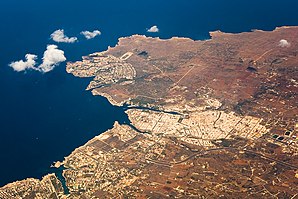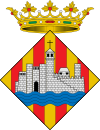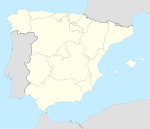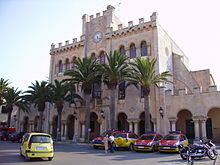Ciutadella
| Ciutadella municipality | ||
|---|---|---|
 Ciutadella aerial view
|
||
| coat of arms | Map of Spain | |

|
|
|
| Basic data | ||
| Autonomous Community : |
|
|
| Island: | Menorca | |
| Coordinates | 40 ° 0 ′ N , 3 ° 50 ′ E | |
| Height : | 24 msnm | |
| Area : | 186.34 km² | |
| Residents : | 29,840 (Jan 1, 2019) | |
| Population density : | 160.14 inhabitants / km² | |
| Postal code : | 07760 | |
| Municipality number ( INE ): | 07015 | |
| Nearest airport : | Maó / Sant Lluís ( Aeroport de Menorca , 39 km ) | |
| administration | ||
| Official language : | Catalan , Castilian | |
| Mayor : | José M. de Sintas Zaforteza ( Partido Popular (PP) ) | |
| Website : | www.ajciutadella.org | |
| Location of the municipality | ||
Menorca
|
||
Ciutadella [ siwtəðˈeʎə ] ( Spanish : Ciudadela [ θjuðaˈðela ]) is a municipality on the west side of the island of Menorca with 29,840 inhabitants (as of January 1, 2019). The city of Ciutadella was the capital of Menorca from ancient times to the 18th century and was then replaced by Maó . Today (as of January 1, 2015) it is the largest city on the island, the seat of the island's bishop, ferry port and tourist destination, with a slight margin over Maó.
geography
The city of Ciutadella is located on a natural harbor on the west coast of Menorca. The municipality is the largest on the island in terms of area and covers more than a quarter of its total area.
Due to the special location of the port, a phenomenon known as rissaga occasionally occurs here . If several meteorological factors come together, tsunami- like giant waves can arise in the port canal . The water is first sucked out of the bay and returns as a giant wave. This happened on June 21, 1984, when the giant wave caused millions in damage, and on June 15, 2006, when a rissaga caused 30 boats to sink and damaged 100 more.
history
Ciutadella was originally founded by the Carthaginians . In ancient times the city was called Iamona . In the 4th century it was already the seat of a bishop. Later it came under the influence of the Moors and as Medina Minurqa was the only major city on the island. In 1287 King Alfonso III took owned the island for the Crown of Aragon .
On July 9, 1558, the city suffered severe damage from an attack by Ottoman troops. Today's cityscape with its baroque and classical noble palaces and churches is essentially a relic of the 16th to 19th centuries.
During the British rule of the island, Ciutadella lost its capital city function to Maó (Mahon) in 1722. In 1795, however, the early medieval diocese was revived in Ciutadella ; thus the city is at least the religious center of Menorca.
politics
Mayor ( Alkalde ) of Ciutadella is José M. de Sintas Zaforteza ( PP ). The municipal council is composed (as of 2014) as follows:
- Partido Socialista Obrero Español (PSOE): 5 seats
- PSM - Ensada Nacionalista (PSM-EN): 4 seats
- Partido Popular (PP): 10 seats
- Unió des Poble de Ciutadella de Menorca (UPCM): 2 seats
Culture and sights
The old town
The historic old town is well worth seeing. The main square of the town is located high above the harbor Plaça des Born with the Town Hall (Ayuntamiento), which on the Alcázar , the stronghold of the Moorish governor, goes back and its present form from the late 19th century by the architect Josep Maria Sagnier received . In the middle of the square, a white obelisk erected in 1857 commemorates the pirate attack in the 16th century. The square is surrounded by the Teatre del Born and aristocratic palaces such as the Palau Torresaura and the Palau Salort .
The center of the actual old town is the Gothic cathedral Santa Maria de Ciutadella , which was built from 1302 to 1362. The Bishop's Palace is attached to it. In the south of the old town there is a former Augustinian monastery, which today houses the Museu Diocesà de Menorca , the baroque monastery church Església des Socors and the fish and meat market on Plaça de la Llibertat .
The eastern end of the old town is Plaça d'Alfonso III , also known as Plaça de ses Palmeres because of its palm trees . The square is dominated by a historic windmill, the Molí des Comte, built in 1778 .
Architectural monuments in the surrounding area
Outside the city center, in the municipality of Ciutadella, there are some important buildings from Menorca's early history. The three talayots of Montefí are located directly on the eastern edge of the city . The site also has some artificial burial caves ( hypogea ). South of the road to Maó is the Naveta des Tudons , the most famous of the megalithic tombs ( navetes ) found on Menorca and Mallorca. There has always been a famous legend about the Naveta des Tudons - namely a legend about the lack of a stone in the nave. It is a unique building of its kind. There are residential buildings with a similar horseshoe-shaped floor plan on Menorca in Son Mercer de Baix near Ferreries , z. B. the Cova des Moro .
Further east lie the Talayot -Fundplätze Torrellafuda and Torretrencada . In the south there is the talayot settlement of Son Catlar and on the north coast the necropolis of Cala Morell .
The Ministry of the Environment has proposed that the north coast be included in a future national park project. This triggered major discussions among the population. The plenum of the city council has spoken out against the said proposal.
Museums
- Museu Diocesà de Menorca
- Casa Museu Pintor Torrent
Puerto natural
Ciutadella has a small natural harbor, the Tramuntana, from which you can get to Menorca, Mallorca and Barcelona. A couple of times a year you can observe a so-called Meteotsumani, which means that the sea level first drops and then flows back in a wave back above the original level. Sometimes the beaches are covered and damage is done.
Streets and squares
Ciutadella is characterized by its typical, narrow streets that have strange names such as Que no passa (“What doesn't happen”). They take their course in Plaça Nova or Plaça Espanya ("New Square" and "Square Spain") and end at the Catedral de Ciudadela. Further in this direction, towards the town hall, is the Plaça des Born, from where you can get to the port in question and find a large obelisk commemorating the Turkish attack on July 9, 1558.
Events
Every year on January 17th, the Processó des Tres Tocs commemorates the capture of the city by King Alfonso III. However, Ciutadella is most famous for its equestrian games on St. John's Day ( Festes de Sant Joan ), which are broadcast live on television.
traffic
Ciutadella is the western end point of the island's main road Me-1, which crosses Menorca lengthways from Maó (and is also the only road connection between the municipality and the rest of the island). The Me-24 road leads south towards Cap d'Artrutx . Ciutadella has had a modern bypass since the beginning of the 21st century.
Not far from the old port, in the sa Oleo district, a new port terminal was built right off the coast, so that the old, narrow port is only used as a marina. A ferry line operated by the Iscomar shipping company connects Ciutadella with Alcúdia on Mallorca and Barcelona on the mainland.
tourism
There are 21 bathing bays and beaches in the municipality of Ciutadella. Hotel and apartment settlements have emerged in some bays. Larger holiday resorts in the municipality of Ciutadella include Cala en Forcat and Cala en Blanes west of the city center, Santandria and Cala Blanca immediately south of the city and the three settlements of Cap d'Artrutx , Cala en Bosch and Son Xoriguer on the southwest tip of the island. The north, on the other hand, is poorly developed, the only larger holiday area is Cala Morell .
Town twinning
Ciutadella is connected to through town twinning
- Alcúdia , Mallorca , Spain
- Barcelona , Catalonia , Spain
- Cursi , Apulia , Italy
- Cordoba , Argentina
- Oristano , Sardinia , Italy , (1991)
Honorary citizen
- José Roberto Torrent Prats (1904–1990), painter
Daughters and sons of the church
- Albert Torres Barcelo (* 1990), racing cyclist
- Francesc de Borja Moll i Casasnovas (1903–1991), Menorcan linguist, philologist and author
- Josep Moll i Marquès (1934–2007), Spanish politician and journalist
- Joan Pons (* 1946), opera singer (baritone)
- Ignacio Ponseti (1914-2009), orthopedist
- Josep Maria Quadrado (1819–1896), historian, writer and publicist
- Sebastià Taltavull i Anglada (* 1948), Roman Catholic clergyman, Bishop of Mallorca
- José Roberto Torrent Prats (1904–1990), Menorcan painter
Web links
Individual evidence
- ↑ Cifras oficiales de población resultantes de la revisión del Padrón municipal a 1 de enero . Population statistics from the Instituto Nacional de Estadística (population update).
- ↑ ajciutadella.org: Coorporació municipal . Retrieved May 29, 2014.
- ↑ Ajuntamento de Citadella: PLAN DE DESARROLLO TURÍSTICO DE CIUTADELLA 2014-2015 ( Memento of the original from May 3, 2014 in the Internet Archive ) Info: The archive link has been inserted automatically and has not yet been checked. Please check the original and archive link according to the instructions and then remove this notice.





